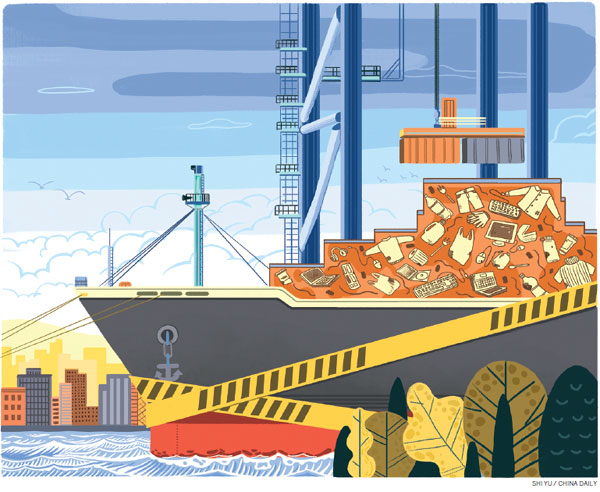China no longer willing to be a dumping ground for US waste


There have been many stories in US news media lately about how China's ban on foreign waste has caused recycling chaos in their country.
A National Public Radio story last week described the impact on Portland, Oregon, quoting a spokesman for local Rogue Waste as saying that the company had no choice but to take all of its recyclable material to the local landfill.
Few Americans know that one of the largest US exports to China is recyclable solid waste, as Yukon Huang, author of the book Cracking the China Conundrum: Why Conventional Economic Wisdom is Wrong, likes to remind people. He noted that many US Commerce Department officials had no idea that was the case.
Every day, some 3,700 shipping containers full of recyclables are trucked to US ports, loaded onto ships and sent to China. The items in those containers include plastics, metal, paper, cardboard, and textiles, which Chinese manufacturers use as raw materials, as Bloomberg News outlined in a report tracing the process.
The US exported some 37 million metric tons of scrap commodities valued at $16.5 billion to 155 countries last year. China accounted for almost one-third of that total, about $5.2 billion.
The State Council, China's Cabinet, however, announced on July 18 new regulations banning the import of foreign waste. On the same day, China notified the World Trade Organization that it will no longer accept imports of 24 types of solid waste.
The move will help reduce the health and environmental risks posed by the waste, and also free up more of China's large but somewhat chaotic recycling industry to tackle the rapid increase of solid waste produced by 1.3 billion Chinese themselves.
The US, China, Brazil, Japan and Germany are the leading generators of waste. The US produced about 228 million tons of waste in 2006, a figure that climbed to 254 million tons by 2013. China, which has a population four times the US', has caught up in recent years, producing 190 million tons of waste per year.
US news reports have all focused on the difficult situation facing the US recycling industry. Almost none has delved into how much US households have contributed to the severe pollution in China over the years by exporting such waste and how average Americans should change their lifestyle to produce less waste for the sake of the planet.
And Minister of Environmental Protection Li Ganjie vowed on Aug 22 to maintain high pressure on Chinese companies that process imported foreign waste so that they comply with the safety regulations, after about 60 percent of companies that process imported foreign waste were found in a recent probe to have violated relevant rules.
Relocation of pollution has long been a strategy by advanced countries to exploit the often lax environmental standards in developing countries. It is a blemish that few Western companies like people to know about while they brag about their so-called corporate social responsibility.
Tackling and recycling the mounting domestic solid waste in China will be an ever daunting task. But facing such a challenge reflects China's determination to embark on a more environmentally sustainable path, rather than pursuing economic growth at all costs.
The author is deputy editor of China Daily USA.

































